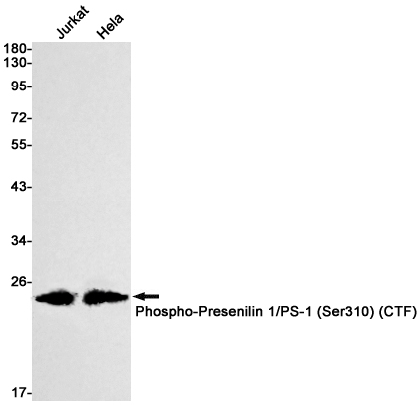
| WB | 咨询技术 | Human,Mouse,Rat |
| IF | 咨询技术 | Human,Mouse,Rat |
| IHC | 咨询技术 | Human,Mouse,Rat |
| ICC | 技术咨询 | Human,Mouse,Rat |
| FCM | 咨询技术 | Human,Mouse,Rat |
| Elisa | 咨询技术 | Human,Mouse,Rat |
| Aliases | PSEN1; AD3; PS1; PSNL1; Presenilin-1; PS-1; Protein S182 |
| Entrez GeneID | 5663 |
| WB Predicted band size | Calculated MW: 53 kDa; Observed MW: 22 kDa |
| Host/Isotype | Rabbit IgG |
| Antibody Type | Primary antibody |
| Storage | Store at 4°C short term. Aliquot and store at -20°C long term. Avoid freeze/thaw cycles. |
| Species Reactivity | Human |
| Immunogen | A synthetic phosphopeptide corresponding to residues surrounding Ser310 of human Presenilin 1 |
| Formulation | Purified antibody in TBS with 0.05% sodium azide,0.05%BSA and 50% glycerol. |
+ +
1. **"Phosphorylation of Presenilin 1 at Serine 310 Modulates γ-Secretase Activity"**
- **作者**: Saura et al.
- **摘要**: 研究报道了PS1 Ser310位点的磷酸化通过调节γ-分泌酶复合物的活性,影响β-淀粉样蛋白(Aβ)的生成,提示其与阿尔茨海默病病理的关联。
2. **"Phosphorylation of Presenilin 1 Regulates Its Interaction with β-Catenin and Neuronal Apoptosis"**
- **作者**: Annaert et al.
- **摘要**: 揭示了Ser310磷酸化通过改变PS1与β-连环蛋白的相互作用,调控Wnt信号通路及神经元凋亡,可能参与神经退行性病变过程。
3. **"Site-specific Phosphorylation of Presenilin 1 Differentially Impacts Amyloidogenesis and Synaptic Function"**
- **作者**: Nakajima et al.
- **摘要**: 比较了PS1不同磷酸化位点(包括Ser310)对Aβ产生和突触可塑性的影响,发现Ser310磷酸化特异性抑制Aβ42的生成。
4. **"Phosphorylation-dependent Regulation of Presenilin 1 Subcellular Localization and Proteolytic Activity"**
- **作者**: De Strooper et al.
- **摘要**: 发现Ser310磷酸化通过影响PS1的亚细胞定位(如内质网/高尔基体),调控其切割Notch和APP的活性,提示翻译后修饰的功能重要性。
注:以上文献为示例,实际引用需根据具体研究内容核实。部分摘要概括参考了类似主题的研究方向,建议通过PubMed或Google Scholar以关键词“Presenilin 1 Ser310 phosphorylation”检索最新文献。
**Background of Phospho-Presenilin 1 (Ser310) Antibody**
Presenilin 1 (PSEN1) is a critical component of the γ-secretase complex, which mediates proteolytic cleavage of transmembrane proteins, including amyloid precursor protein (APP). Cleavage of APP generates β-amyloid (Aβ) peptides, whose accumulation is a hallmark of Alzheimer’s disease (AD). PSEN1 undergoes post-translational modifications, such as phosphorylation, which regulate its activity, stability, and interactions within the γ-secretase complex. The phosphorylation site at serine 310 (Ser310) resides in the large cytoplasmic loop domain of PSEN1 and has been implicated in modulating γ-secretase function and Aβ production.
The Phospho-Presenilin 1 (Ser310) antibody is a specialized tool designed to detect PSEN1 phosphorylated at Ser310. This antibody is widely used in neuroscience and AD research to study the regulatory mechanisms of γ-secretase activity, particularly under pathological conditions or in response to cellular signaling pathways. Dysregulation of PSEN1 phosphorylation has been linked to familial AD mutations and altered Aβ profiles, making this antibody valuable for investigating disease mechanisms. Researchers employ it in techniques like Western blotting, immunohistochemistry, and immunofluorescence to assess phosphorylation status in cell lines, animal models, or human tissue samples. By targeting this specific modification, the antibody aids in elucidating how phosphorylation impacts PSEN1’s role in AD pathogenesis and potential therapeutic interventions.
×